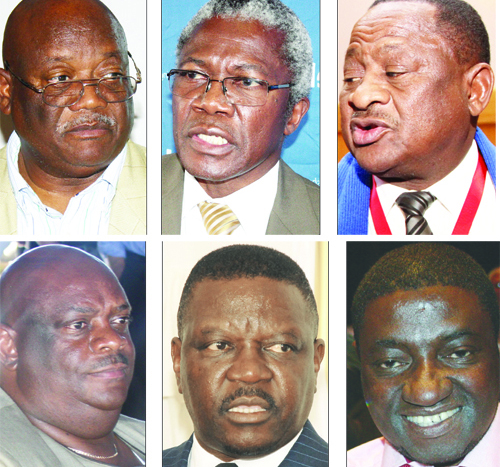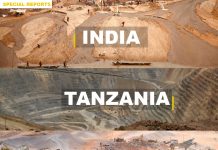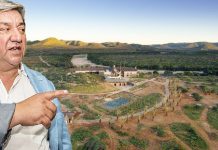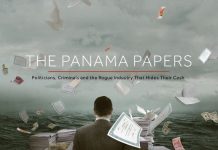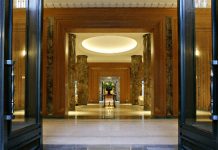By Joshua Olufemi and Emmanuel Mayah | 2 July 2019
WORTH a staggering US$15.4 billion, Nigeria’s businessman and industrialist, Aliko Dangote, is on the Forbes rich list as the wealthiest man in Africa.
But does Dangote pay his fair share of tax in Nigeria or is he hiding assets abroad? That remains unclear.
Yet that question has become even more relevant across the globe following discoveries of several secret shell companies linked to the businessman, his allies and relatives.
According to internal data of the Panama−based offshore−provider, Mossack Fonseca, obtained by the German newspaper Süddeutsche Zeitung and shared by the International Consortium of Investigative Journalists (ICIJ), Dangote, his relative, Sayyu Dantata, as well as his business allies have over the years used shell companies domiciled in controversial tax havens in their business transactions.
The investigation unveiled the cloak of secrecy provided by Mossack Fonseca, a Panamanian law firm that specializes in creating offshore companies, some of which have been used by con men and women to hide Ponzi schemes, predatory lending scams, and other financial frauds.
Mossack Fonseca has, however, in a statement to ICIJ denied wrongdoings, saying, as a registered agent, it merely helps incorporate companies, and that before agreeing to work with a client in any way, it conducts a thorough due−diligence process.
Dangote and the game of shares
Dangote is one of the most prominent clients of Mossack Fonseca, and in Panama alone, based on company registration addresses provided by shareholders, 13 shell companies registered by the firm are directly linked to persons and companies who in turn are linked to the billionaire and his allies.
Dangote, alongside his brother, Sayyu Dantata, the founder of MRS Holdings (a leading West African oil−marketing firm, which acquired Chevron−Texaco’s downstream assets in 2007) bought equal shares of 12,500 each from OVLAS SA, a shell company registered in Seychelles, on October 6 2003.
Seychelles is a well−known tax haven used by businessmen and politicians and celebrities to perpetrate shady business deals. On the same date also, a company they both own as at 2003, MRS Oil and Gas Co. Limited bought 25,000 numbers of shares from OVLAS S.A.
According to the documents, three years after they existed as shareholders of the company, the trio – Dangote, Dantata and M.R.S Oil and Gas Company Limited – ceased to be shareholder in the company.
That was on April 12 2006.
But in an arrangement that seems curious, Dangote was issued a higher amount of shares – 250,000 – on the same day he resigned.
In the same manner, his brother, Dantata, was issued the same amount of 250,000 shares.
That means the businessmen simply resold the shares back to themselves. Their company, MRS Oil and Gas, was re−issued 500,000 shares.
After three years of holding the shares, they all ceased to be shareholders. Again, they resumed possession of the shares again as in the previous time, but this time it seems Dangote sold his shares to Dantata and M.R.S Oil and Gas Company Limited.
Dangote ceased to be shareholder permanently on July 6 2009, and Dantata’s number of shares doubled to 500,000 shares while MRS Oil and Gas CO, LTD retained its 500,000 shares. Documents show Dantata never sold, transferred his shares or ceased to be a shareholder till date.
Petrowest S.A: Same folks, same tricks
Before Dangote ceased to be shareholder of M.R.S Oil and Gas Limited, himself, Dantata and their co−owned company, M.R.S Oil and Gas Co. Limited, was used to buy shares in Petrowest S.A, another company registered in Seychelles on October 6, 2003.
Dangote and Dantata bought equal shares of 12,500 each from Petrowest S.A. MRS Oil and Gas Co. Ltd also bought 25,000 numbers of shares from Petrowest, just as was done with OVLAS S.A.
Again, three years after they existed as shareholders, the trio – Dangote, Dantata and M.R.S Oil and Gas Company Limited ceased to be shareholders in the company. That was also dated 12 April 2006.
Dangote suddenly ceased to be shareholder. According to documents available to Premium Times, on the same day, Dangote was re−issued a higher number of shares – 250,000.
In the same manner, his brother, Dantata, was issued the same amount of 250,000 shares. This literary means they resold the shares back to themselves. Their company MRS Oil and Gas was re−issued 500,000 shares.
A web of intrigues, companies within companies
Dangote and Dantata have allegedly used their multiple companies in Nigeria and other countries to secure huge loans.
For instance in 2010, the management of Bank PHB, a Nigerian bank, dragged M.R.S Holdings Limited, owned by Dantata, to court over the non− payment of US$58 million loan the bank granted it to purchase Chevron Texaco in 2008.
In a similar development in September 2014, Sani Dangote, younger brother to Dangote, was dragged before a Federal High Court in Lagos over his alleged failure to liquidate about N5 billion loan granted him by Union Bank.
In its suit, Union Bank alleged that in a bid to evade payment of the loan, Sani Dangote made efforts to deplete funds in his accounts by diverting them to Dubai, Canada and Switzerland.
A dark corridor
Shell companies constitute some of the darkest, sometimes convoluted, corridors in global illicit finance.
Shell companies are usually domiciled in notorious tax havens like Cayman Island, Monaco, Panama, Samoa, Switzerland, Luxembourg, Hong Kong, Singapore, Lebanon, Mauritius, British Virgin Islands, St. Lucia, Belize, Macao and close to a hundred others; usually tiny countries.
Owners create Shell companies for a host of dodgy business reasons.
Some people own shell companies so that when they acquire assets like private jets and real estates, governments do not find out to demand tax.
Some others set up shell companies to raise funds before starting operations, to attempt a takeover or as a front for an illegal business.
The purpose (s) for which Dangote and his allies set up their own secret companies is not exactly clear. But shell companies are not illegal, and not all owners use them to avoid tax or hide assets.
However shell companies are at times used for tax avoidance.
This they do through Transfer Pricing, a complex structure that allows businesses often in third world countries to shift profits to shell companies overseas to allow them pay little or no tax in the country where they made the money.
Evidence abounds in the data that the Panamanian company, Mossack Fonseca, offers clients aggressive “reinvoicing” services that are specifically designed to help companies avoid/evade taxes.
It remains unclear whether Dangote and his associates used their shell companies to buy any such service from Fonseca.
Many people using offshore companies do so legally and offshore companies indeed have many legal purposes.
Shell companies, experts say, are entities that have no active businesses and usually exist only in names as vehicles for another company’s business operations.
In essence, they are corporations that exist mainly on paper, have no physical presence, employ no one and produce nothing. They are frequently used to shield the identities of owners and/or to hide money.
Because shell companies are at times associated with fraud, their activities are of big concerns to international bodies such as the Organisation for Economic Co−operation and Development (OECD).
Money laundering, billing schemes, fictitious service schemes, bankruptcy fraud, tax evasion, and market manipulation are some of the fraudulent activities facilitated by shell companies, several past investigations by ICIJ and this newspaper have shown.
Given that they at times have nominee directors, often have no phone number, no e−mail address, no physical address, no company logo, no contact person and no federal identification number and because the host country deliberately did not collect enough ownership information on company formation documents, there are usually no paper trails for law enforcements to trace back to a particular individual or individuals in most financial investigations.
Dangote and a business of secrecy
A 2015 investigation by Premium Times, in partnership with the International Consortium of Investigative Journalists, and other major media organisations around the world, had named Dangote among some of Nigeria’s wealthiest industrialists, former government officials and their relatives, who operated highly secretive foreign accounts with the Swiss branch of banking giant, HSBC.
Some of those named in that global investigation were found to have concealed their identities for years and using codes perhaps to shake off tax authorities from accounts, some of which held illicit assets from criminals, traffickers, arms dealers and other outlaws.
That investigation, published in February last year showed how HSBC profited doing business with people who stole from their countries and some of the world’s most notorious con artists, including people who made a fortune fuelling wars in Africa.
The bank helped questionable characters conceal their wealth despite knowing their sources, and devised ways to hide the identities of the owners of the secret accounts from governments around the world.
At least 100 000 secret bank account operators who owned about $100 billion were exposed in the leaks, unsettling investigators in several countries.
Among those accounts were that of Dangote, who became an HSBC private account client in July 2003.
The account appeared in the name of Development Projects Corporation, its registration address in Tortola, in the British Virgin Islands, a notorious tax haven, where individuals and corporations usually incorporate shell companies to hide assets.
Dangote’s account was in operation till August 2004.
It is not clear to what use Dangote put the account and perhaps because he closed it long before the data were stolen, bank records did not indicate any balance on the account.
Our hands are clean – Dangote
Despite several documents linking Dangote to those offshore companies, the businessman’s spokesperson insisted he never had any relationship with the offshore entities.
The spokesperson for the Dangote Group, Tony Chiejina said neither Aliko Dangote nor Dangote Industries Ltd (DIL) has any form of relationship with these alleged four off shore companies.
“The Group has four quoted companies on the Nigerian Stock Exchange and we cannot afford to tarnish our reputation or conduct our business in an unethical manner given this profile. Our reputation is paramount to us and we are conscious of the downside of it. We thank you for upholding the principal ethics in journalism – ‘when in doubt, check’. Dantata could not be reached.
– This article is produced by the Premium Times from Nigeria in collaboration with the African Network of African Reporting Centres (ANCIR).

